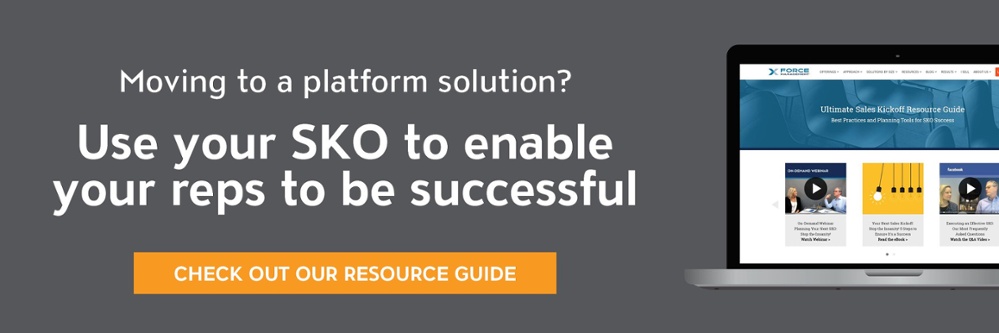
Enable Your Salespeople to Sell the Platform Solution
Categories: Front-line Managers | Sales Conversation
If your growth model has you moving from a point solution to a platform solution, it's likely you are assessing how well your sales organization is enabled to execute this new type of sale.
It's a trend we see frequently with the high-tech companies with which we work. The decision to create and sell a broader solution has its benefits, but without enabling your sales teams to sell that new functionality, the decision will never realize its potential.
Don't simply train your sales teams on the features and functions of your platform, rather equip them with how to sell the value of the holistic solution broader and deeper in the prospect organizations. It's about articulating value and differentiation, but it's also necessary to define the sales process and qualification method that will enable your reps to effectively maneuver through more complex sales.
What business problems does your platform solution solve?
It starts with clearly defining how your reps need to adjust the sales conversation. With a platform solution, it's likely that they need to get higher and broader in prospect organizations. They're reaching for larger opportunities and as a result dealing with higher level buyers and more decision makers. They need clarity in how the platform solution solves business problems in a different way.
- How does that solution solve business challenges and how does it drive value for the various roles within that organization?
- Who owns those business problems? How does the solution impact those additional roles?
Reps need to be equipped to have the value-based conversation in a way that uncovers those business needs. One of the most basic things you can do as a sales organization is ensure that you are aligned on the key value and differentiation of the platform solution.
How does a platform shift change the buyer conversation?
These higher and broader conversations force salespeople to cross the enterprise into other business units. Platform solutions are often part of cross-organizational initiatives and they demand a fluency as to what these other roles are and what they own. An initiative like digital transformation, for example, requires CMO buy-in, where before the salesperson may have previously just needed to have an IT discussion. The CMO cares about different things than the IT department does. How are you equipping your salespeople to have those "outlier" persona conversations? How will they be prepared to have a relevant and business-focused conversation with these roles.
How will the decision be made?
Your point solution probably had a lower level buyer and/or maybe even a single decision makers. When you're selling a platform solution, it is important you have a qualification process in place that accounts for understanding the complexities of the buying process.
A qualification system like MEDDICC or MEDDPICC, that drives discipline around gathering important criteria around opportunities is essential for a platform sale. It helps you understand things like the economic buyer, maneuver through decision criteria and the buyer's decision process. Many times in a platform play, the client doesn't even know who owns the issue that you're trying to solve and may not even understand who all the players are in that company.
The struggle is to clearly define the process because it is so big. You have to land on the business problem you’re solving and the outcomes to which your solution is driving. Then, you need to build the justification necessary to move to other stakeholders in the company. You may have to teach them how the decision process gets made. You may need to show them the justification on how the business problems get solved.
Companies that don't effectively equip this qualification process lose a lot of value because they short change the opportunities by not understanding the impact of the problem and who owns it. As a result, you leave a lot of margin on the table because the deal was never expanded in a way that can be sold.
The need for proof
When the solution is broader and your price increases, you have to mitigate the risk that the client feels from signing on for a bigger piece of the pie. Here's a common scenario. Let's say you get to the CFO. The CFO sees how the solution can help on paper, but is looking for proof that you can do what you say you can do. Without it, he/she may stop the deal or push for a smaller pilot project. While a pilot project gets you in the door, it also presents challenges. You're often seen as a one-off initiative and not tied to the overall business strategy. While it can be helpful for early proof points, the pilot strategy still puts you in a place where you need to eventually elevate the business value of your solution. Proof points can diminish the risk perceived by the buyer when moving to a platform solution. Take the time to strategize how you can gather these measurable results and package them in a way that the sales teams can use them to their advantage.



